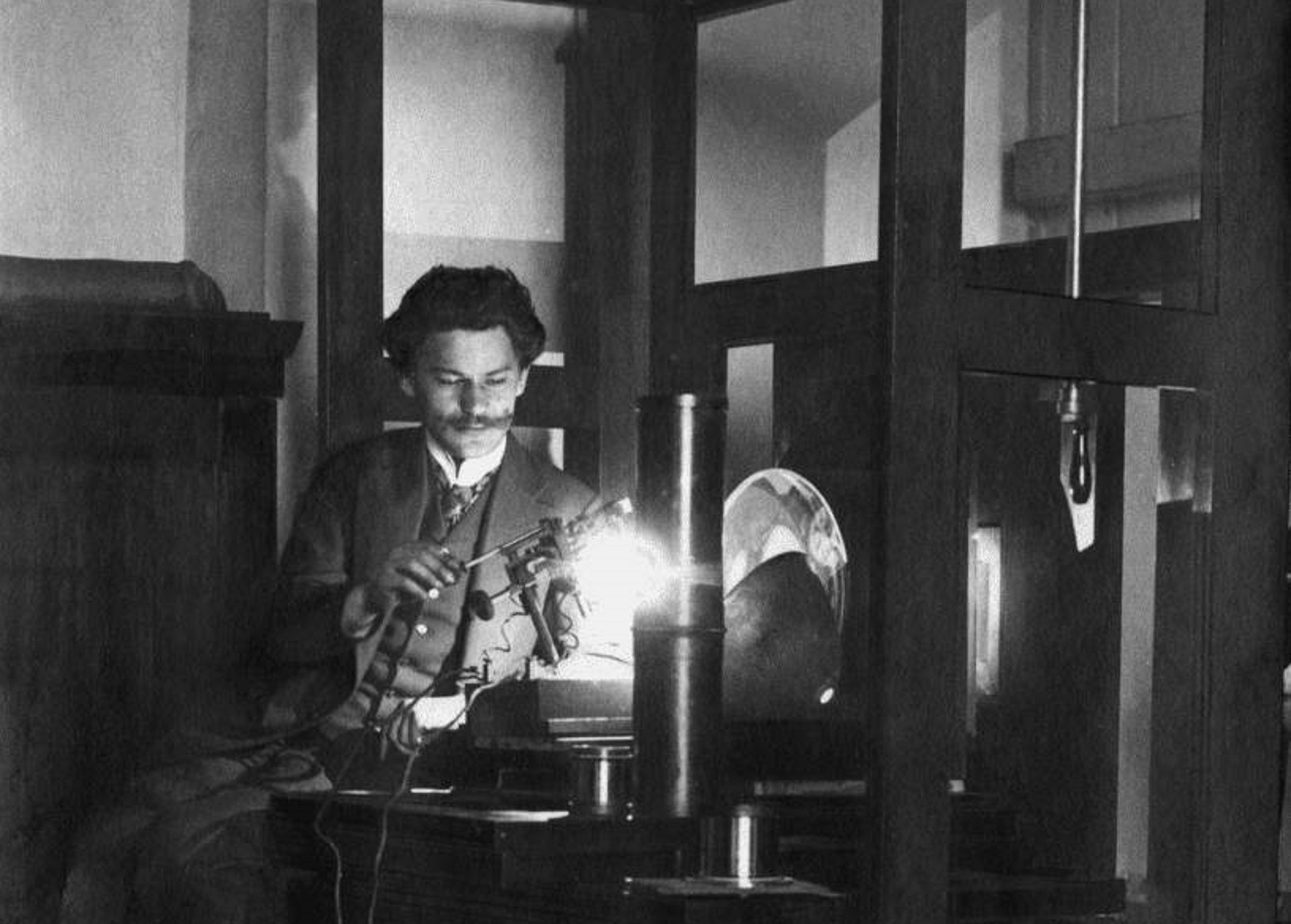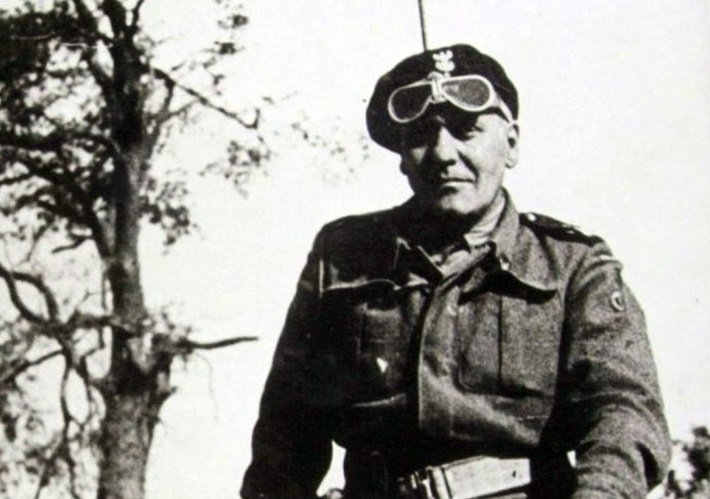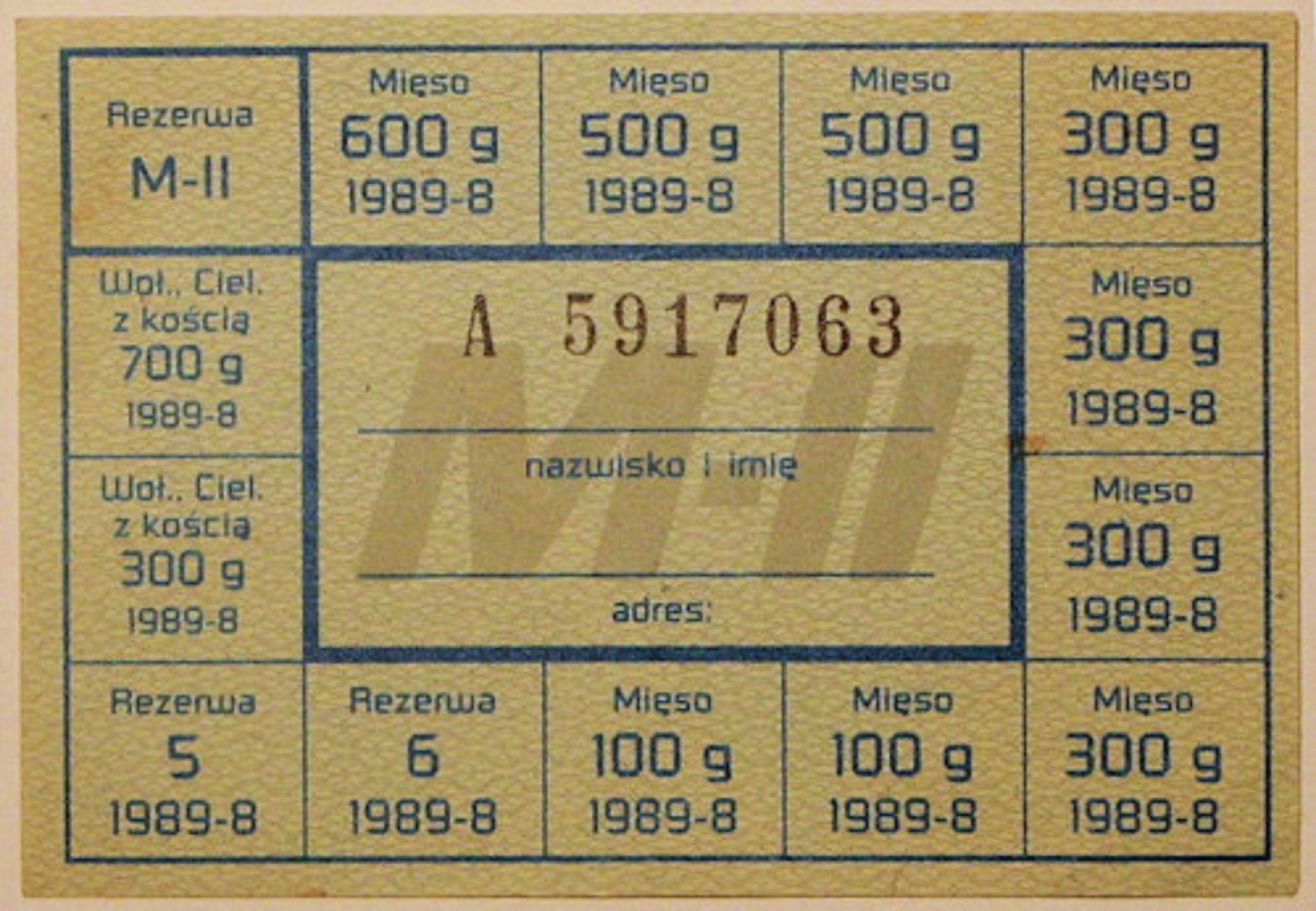The nature of the August 1980 strikes was not unlike that of a social contract. Tens of thousands of individuals who took industrial action had agreed between themselves that society must be restored after years of enduring erosion and decay at the hands of the Communist regime.
by Krzysztof Mazur
A political community could thus be re-established. According to one commentator who witnessed these events, “the contract is concluded at the moment when people gather in a crowd, standing around, and someone jumps onto an earthmover, and speaks to the crowd and in the name of the crowd – it is at that very moment that a crowd is transformed into a social movement.” [1] Social contract results in transforming the social mass into society. A sovereign entity thus comes into being, a political subject conscious of its goals, an exponent of the will of the people.
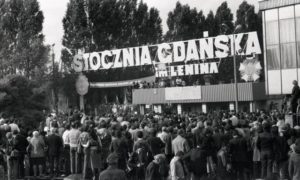
Striking workers had an unshakeable conviction that “under normal circumstances” it was the people who played the role of a sovereign in a state. This conviction is corroborated by the Programmatic Resolution [Uchwała programowa] passed by delegates during the First National Convention of the Independent Self-Governing “Solidarity” Trade Union [NSSZ “Solidarność”] in 1981. The authors of the document recognized that “the rule of the people is a principle that must not be disavowed. The rule of the people must not be the rule of groups of people who place themselves above society, who grant themselves the right to represent the interest of society and to determine what society needs. Society needs to be given the opportunity to speak with a full voice, to express diverse social and political views, it has to be given the opportunity to organize itself.” [2] In other words, those who called Solidarity into being regarded a democratic state under the rule of law, where society was sovereign, as their ideal. In this type of society, the law, the foundation of all social relations, has its roots in social will.
The leading role of the Party
Those who went on strike in August 1980 understood they were not living “in normal circumstances”: in the Polish People’s Republic, the Polish United Workers’ Party (PZPR) that was the sovereign. It was through the Party that the working class was to fulfill its leading role: both in the socialist revolution and in the task of building a new, class-free society. The preamble to the 1952 Constitution of the Polish People’s Republic states that “the present rule of the people in Poland is founded on the alliance between the working class and the peasantry. Being the leading social class, the working class takes the principal role in this alliance.” [3] The following regulation was added to the above, on the strength of a 1976 amendment to the constitution: “the Polish United Workers’ Party is society’s leading political force in the building of socialism.” [4] In other words, the Party was granted unlimited power in political and social life, as well as over the economy. It was the Party that would determine who was fit to be a member of parliament, what should be manufactured and when, what social organizations have the right to operate legally, and how they ought to operate.
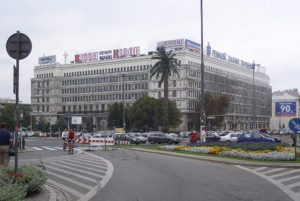
The emergence, in August 1980, of that “strange subject” – society – proved something of a challenge. Striking workers recognized themselves as representatives of society which, “under normal circumstances” holds supreme power within the state. Party officials were guarding constitutional order, which recognized the PZPR as sovereign. At the same time, both sides acknowledged they had to impose a limit on their demands: the strikes had to take into account geopolitical realities; the authorities, for their part, could not disregard the extent of the strikes and the determination of the negotiators. This was how society and the totalitarian authorities came to be on equal terms: a peculiar form of partnership, which did not conform to any contemporary political doctrine. At the same time, both sides continued to regard themselves as the sole legitimate sovereignty.
“Being in power? We’re not that keen!”
The Gdańsk Agreement states that “by calling into being new, independent, self-governing trade unions, the Inter-Factory Strike Committee [Międzyzakładowy Komitet Strajkowy, or MKS] declared that these unions will abide by rules stipulated by the Constitution of the Polish People’s Republic. The new trade unions would defend the social and economic interests of workers, and were not intended to take on the role of a political party. They were founded on the principle of social ownership of the means of production, which was the basis of the socialist political system currently in force in Poland. While recognizing the leading role of the Party in state matters, and without attempting to undermine the established network of international alliances, the unions sought to ensure that the working people were granted the appropriate means of control, of expressing their opinion and protecting their interests. [5] This stipulation captured the gist of the agreement. State authority remained the Party’s: members of the union pledged not to undermine the PZPR monopoly in that field. This is why striking workers took the conscious decision not to demand free elections from parliament and the national councils (which passed for local authorities in the Polish People’s Republic, which did momentarily come up as the twenty-second demand. While this relinquished demand was in keeping with the principle of the power of the people (which the unions embraced), it was also explicitly confrontational towards the constitutional order of the Polish People’s Republic. Striking workers were hoping that, in exchange, the Party would retire from its supervisory role when it came to the operation of social organizations, and would recognize Solidarity as an institution of social control, entitled to exercise a veto on key economic issues.
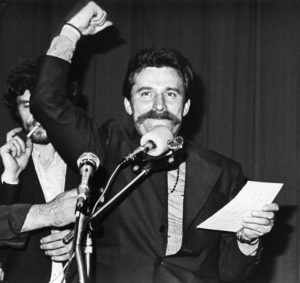
In the words of Tadeusz Kowalik, adviser to the Inter-Factory Strike Committee, “we used the expression ‘the leading role of the Party within the state’ because, in our view, to do so was to protect non-state, social organizations from the Party’s interference. The state was synonymous with state authority, and we wished to confine the dominance of the Communist Party to that field alone. We believed that the formula included institutions went far beyond that, in that it stated the leading role of the party in the building of socialism, which was said to involve the entire society. We, by contrast, wanted to say this: we will not question the power of the Communists when it came to politics – irrespective of how much support the Party would have in society. In exchange, as far as social life was concerned, the Party would pledge not to go beyond its actual scope of influence, which depended on how reliable the Party was seen to be. With regard to the new trade unions, this meant that the party apparatus would have no authority over them.” [6] Thus the Party was to remain the supreme political power, but, from that moment on, society was entitled to inspire and control the Party’s major decisions. Lech Wałęsa saw the distribution of competences as follows: “When it comes to governing, we’re not that keen. This is where we’ve got least to say. Governing is for savvy people, for lawyers – and some of us can’t even spell properly; after all, we’re laborers. What we want to be is not pen-pushers, but activists and controllers.” [7]
Divided sovereignty
Thus the August Agreements constituted the second stage of the social contract. The first stage had consisted in the political community emerging as a result of the people reaching an understanding among themselves. In this second stage, representatives of that community (the MKS representative committee) established the rules for peaceful co-operation with contemporary state officials. The second stage of the social contract was the agreement between the totalitarian authorities and society.

A new political system thus emerged, founded on three rules. First, society (Solidarity) pledged not to question the principles of the Polish People’s Republic political system as expressed in the constitution. Of primary importance here were the principle of social ownership of the means of production, the leading role of the Party and international commitments. Second, matters relating to the operations of the state (defence, foreign and domestic policy) remained under Party administration. At the same time, Solidarity made sure it had the option of exerting an institutionalized influence on the political system. This included, above all, the right of initiative and veto power on key economic issues. Third, social matters were placed outside the scope of the “leading role of the Party” and were henceforth in the domain of the social element, independent of politics. This was where the principle of self-governance was to be in force.
Jerzy Jedlicki summarized the new political situation as follows: “the idea of the society being on equal terms with the authorities is a theoretical novelty” being equally alien to democracy and dictatorship. “One of the assumptions underlying this is that sovereignty is divided, with both society and the authorities being autonomous subjects. In Poland, neither society nor the authorities are sovereign, though this lack of sovereignty is due to different reasons.” The result was a conflict-prone system characterized by exceptionally high levels of mutual suspicion. “In a state of this kind, the government will not be derived from the will of the majority of the people, but it will not be able to govern against the people’s will. It will have to strive for its authority and social legitimacy. Sovereignty in such a state will in fact be divided (as is the case in constitutional monarchy and other political systems); it will not, however, be a model of diarchy. Power will rest with the constitutional bodies: Parliament (which at the time had only one chamber, the Sejm) and the government, as well as the Party. For its part, Solidarity and other associations will grant society the self-evident power of controlling the authorities and holding them in check – and perhaps of inspiring their future decisions, too.”
Temporary deal based on trust or lasting alliance?
Those who took part in the events of August 1980 had divergent opinions on how durable this political model was likely to be. Let us cite two views on the matter. As those who were behind the Polish Agreement on Independence, or PPN [Polskie Porozumienie Niepodległościowe] stated in September 1980, “society should regard the social contract concluded between the authorities and the strike committees as a deal based on trust. Because the USSR requires that power (even in a diminished form) is held by the Party, this demand is accepted by society as a temporary compromise. Society leaves the power to the Party, albeit on certain conditions; society, too, will supervise if, and how, these conditions are satisfied.” [8] In other words, the founders of PPN regarded the contract as temporary: the result of an exceptional geopolitical situation.
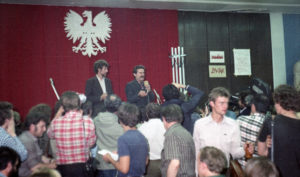
Adam Michnik (to name but one example) had an altogether different view of the matter: “a hybrid system, a cross between totalitarian state organization and democratic social institutions, would be possible. It is, by its nature, a Band-Aid solution, but such solutions at times prove to last the longest.” [9] Several months later, Michnik offered more precise reasons for why he believed this would be a durable solution. “What I propose here is a compromise with the authorities. With authorities I do not like at all, whose rules I do not approve of, but who are for us what a brace is for the sick: oppressive, but indispensable. […] Those in power may well be disliked, but they must be seen as negotiation partners.” [10] Thus, for Michnik, the social contract was not a temporary deal based on trust, but a lasting agreement. Faced with the prospect of imminent, thorough reform, it was the Communists who were to guarantee professional [government] administration that would protect the country from anarchy. In Michnik’s vision, Communists became a vital component of change; a component whose absence would render Solidarity incapable of governing. They became like a plaster cast for the ailing state.
Solidarity as a house of parliament
“The theoretical novelty” of the above solution is undermined slightly by the fact that many commentators attempted to find analogies between history and the current situation. Comparing the present circumstances to the political system of the ancient Polish-Lithuanian Commonwealth was particularly popular in the trade union press. The similar nature of written commitments that a candidate to the Polish throne of that era had to meet was given particular emphasis. In that vein, Kazimierz Dziewanowski wrote that “agreements of this kind have been reached on many previous occasions, throughout history. They were entered into in the feudal period: the result was the English Magna Charta and, some time later, the principle of ‘habeas corpus,’ which safeguarded citizens against arbitrary arrest. In Poland, the same principle was known as neminem captivabimus and dated from 1425-1433. Pacta conventa, or settlements which stipulated the conditions of rule for every monarch, had been another such agreement. In Hungary and Bohemia, pacta conventa were being concluded as early as the fourteenth and fifteenth centuries: in Poland, they became part of the political practice from the sixteenth century onwards. Agreements of a similar kind were also being concluded in other countries, particularly where power was to rest with a foreign dynasty.” [11] The present was not unlike history in that respect: the state’s key decisions were to be taken on the strength of mutual consent from the “house of parliament” (that is, Solidarity) and “the king” (Communist authorities).
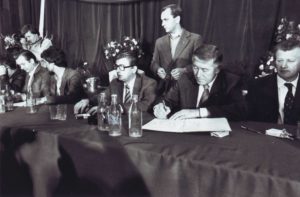
From the left: Marian Jurczyk, chairman of the Inter-Factory Strike Committee (MKS); Marian Juszczuk, deputy chairman of MKS; Kazimierz Barcikowski, deputy Prime Minister; Jarosław Mroczek, member of MKS (standing); Janusz Brych, First Secretary of the PUWP in Szczecin; Stanisław Ozimek, director of Adolf Warski Shipyard in Szczecin (photo by Stefan Cieślak; Creative Commons 3.0)
Success in theory…
In the eyes of a philosopher of politics, the August Agreements are therefore an extremely innovative political experiment, consisting of the quest for a compromise between two contradictory conceptions of sovereignty: the democratic conception of the sovereignty of the people, and the Communist conception of the leading role of the working class represented by the Communist Party. Those who ventured into that experiment were not subtle theoreticians, but activist-practitioners who were lacking in education and were groping for the limits of the possible. Prof. Jadwiga Staniszkis [the eminent Polish sociologist], who had been present at the negotiations at the Gdańsk Shipyard, decided to step down from her role as an adviser: in Staniszkis’ view, the experts’ imagination had been too firmly rooted in the realities of the time, which, for her, had been as “a kind of corruption.” As she has argued, the only people capable of attaining the impossible (that is, securing the formation of free trade unions in the course of negotiations) were those who did not realize the impossibility, and “this ought to be the choice of the workers themselves.” [12]. In other words, the August Agreements happened because those who worked on them and signed them knew they had no right to happen.
… and failure in practice
At the same time, let us remember that the whole experiment ended in spectacular failure on 13 December 1981 [when martial law was imposed in Poland]. The interesting concept proved impossible to implement in practice. An indispensable minimum of trust and good will on both sides had been prerequisite for the new model of governance. It became evident that the authorities could not be depended upon when it came to showing good will and trust. Almost from the very beginning, the Communists sustained an atmosphere of social conflict. Like the majority of theoreticians, the Party concluded there could be only one sovereign within the state.
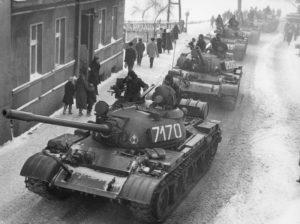
On the 25th anniversary of the August Agreements, Stanisław Ciosek [a former Communist official] said that 31 August [when the agreements were signed] should be a symbol of national concord, a symbol of unity that surpasses historic divisions. Ciosek would have been right – were it not for martial law. That event makes the August Agreements a squandered opportunity of precipitating the evolution of the system towards democracy – rather than a symbol of real national concord. The political model proposed by Solidarity brought with it such an opportunity. This proposal had been temporarily accepted in August 1980, only to be regularly torpedoed by the authorities practically from the beginning of September. (Events such as the “registration conflict” [triggered by changes imposed by the court on the Solidarity statute as the union was being officially registered in October 1980] or the “Bydgoszcz crisis” [Solidarity activists were assaulted during a session of the local National Council] were but the most important manifestations of this strategy.) This is why “31 August” cannot be separated from “13 December.” A feast of national concord ended with tanks on the streets and the death of the Wujek miners. The innovative conception of divided sovereignty, proposed by Solidarity became a failed attempt to avoid such developments.
Notes
[1] J. Jedlicki, Forma i treść umowy społecznej, Warszawa 1980 [samizdat], p. 14.
[2] Programmatic resolution by the Delegates for the First National Convention of NSZZ “Solidarność”, Part One.
[3] Constituiton of the Polish People’s Republic, passed by the Sejm on 22 July 1952. Uniform text of 16 February 1976.
[4] Constitution, article 3.
[5] Protocol of an agreement reached by the Government Commission and the Inter-Factory Strike Committee on 31 August 1980 at the Gdańsk Shipyard, item 1, paragraph 2.
[6] T. Kowalik, “Próba kompromisu. O Komisji Ekspertów MKS w Gdańsku,” Zeszyty Literackie no. 2 (1983), p. 115.
[7] Plan rozmowy układamy wspólnie. Rozmowa z działaczami Międzyzakładowego Komitetu Założycielskiego NSZZ “Solidarność” w Gdańsku, Polityka no. 44 (1 November 1980), p. 6.
[8] “ Polska, September 1980,” PPN no. 47 (2 October 1980), no pagination.
[9] A. Michnik, “Czas nadziei, sierpień-wrzesień 1980,” in A. Michnik, Szanse polskiej demokracji , Warsaw 2009, p. 78.
[10] A. Michnik, “Nadzieja i zagrożenie, październik-listopad 1980,” in Szanse polskiej demokracji, pp. 8485.
[11] K. Dziewanowski, in Czabański Krzysztof (ed.), Niepokoje i nadzieje, Warsaw 1981, p. 24.
[12] J. Staniszkis, Ewolucje form robotniczego protestu …, Wrocław 1981 [samizdat].
Author: Krzysztof Mazur – a philosopher and political scientist with links to the Jagiellonian University in Kraków


